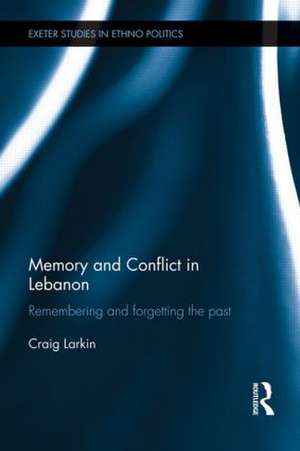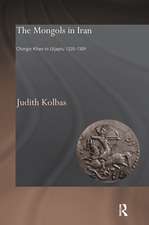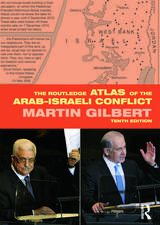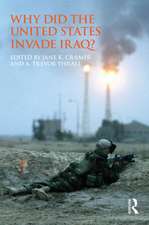Memory and Conflict in Lebanon: Remembering and Forgetting the Past: Exeter Studies in Ethno Politics
Autor Craig Larkinen Limba Engleză Paperback – 22 mai 2015
In considering how the Lebanese youth are negotiating this collective memory, Larkin addresses issues of:
- Lebanese post-war amnesia and the gradual emergence of new memory discourses and public debates
- Lebanese nationalism and historical memory
- visual memory and mnemonic landscapes
- oral memory and post-war narratives
- war memory as an agent of ethnic conflict and a tool for reconciliation and peace-building.
- trans-generational trauma or postmemory.
| Toate formatele și edițiile | Preț | Express |
|---|---|---|
| Paperback (1) | 444.84 lei 6-8 săpt. | |
| Taylor & Francis – 22 mai 2015 | 444.84 lei 6-8 săpt. | |
| Hardback (1) | 1059.84 lei 6-8 săpt. | |
| Taylor & Francis – 16 ian 2012 | 1059.84 lei 6-8 săpt. |
Preț: 444.84 lei
Nou
Puncte Express: 667
Preț estimativ în valută:
85.12€ • 88.87$ • 70.45£
85.12€ • 88.87$ • 70.45£
Carte tipărită la comandă
Livrare economică 04-18 aprilie
Preluare comenzi: 021 569.72.76
Specificații
ISBN-13: 9781138919457
ISBN-10: 1138919454
Pagini: 254
Ilustrații: 30 black & white illustrations, 1 black & white tables, 28 black & white halftones, 2 black & white line drawings
Dimensiuni: 156 x 234 x 17 mm
Greutate: 0.35 kg
Ediția:1
Editura: Taylor & Francis
Colecția Routledge
Seria Exeter Studies in Ethno Politics
Locul publicării:Oxford, United Kingdom
ISBN-10: 1138919454
Pagini: 254
Ilustrații: 30 black & white illustrations, 1 black & white tables, 28 black & white halftones, 2 black & white line drawings
Dimensiuni: 156 x 234 x 17 mm
Greutate: 0.35 kg
Ediția:1
Editura: Taylor & Francis
Colecția Routledge
Seria Exeter Studies in Ethno Politics
Locul publicării:Oxford, United Kingdom
Public țintă
Postgraduate and UndergraduateCuprins
1. Introduction: Beyond the War? 2. Locating a Postmemory Generation 3. Contesting Lebanon: History, Identity and Co-existence 4. (Re)Imagining the Nation: School, Street and the ‘Independence Intifada’ 5. Space, Place and Site: Inhabiting Postwar Memoryscapes 6. Time, Story and Myth: Narrating Lebanon’s Future 7. Conclusions
Notă biografică
Craig Larkin is a lecturer in Comparative Politics of the Middle East at Department of Middle East and Mediterranean Studies, King's College London. He was previously a research fellow at Exeter Politics department, working on an ESRC funded project 'Conflict in Cities and the Contested State' (2008-2012). He holds a PhD in Middle East Studies from the University of Exeter (Institute of Arab and Islamic Studies, 2009), an MA in Criminology and Criminal justice (LLM, 1999) and a BA(Hons) in Law and Politics (LLB, 1998) from Queen's University, Belfast.
His first monograph, Memory and Conflict in Lebanon: Remembering and Forgetting the Past was published by Routledge in January 2012. This research emerged from four years spent in the Middle East (2001-2004), studying Arabic at Damascus University while also assisting in community development projects in Lebanon, Jordan and Iraq. His second co-authored book, The Struggle for Jerusalem's Holy Places: Radicalisation and Conflict will be published by Routledge in 2013.
His first monograph, Memory and Conflict in Lebanon: Remembering and Forgetting the Past was published by Routledge in January 2012. This research emerged from four years spent in the Middle East (2001-2004), studying Arabic at Damascus University while also assisting in community development projects in Lebanon, Jordan and Iraq. His second co-authored book, The Struggle for Jerusalem's Holy Places: Radicalisation and Conflict will be published by Routledge in 2013.
Recenzii
"His writing remains always sober, collected, impartial, and most of all decent, adding much needed substance depth and class to the literature on Lebanon’s history and memory."- Franck Salameh, The Levantine Review, 2012.
Descriere
This book examines the legacy of Lebanon’s civil war and how the population, and the youth in particular, are dealing with their national past. The author explores the efforts of those who wish to forget and those who wish to remember, so as not to repeat past mistakes, shedding new light on trauma and the persistence of ethnic and religious hostility.
























